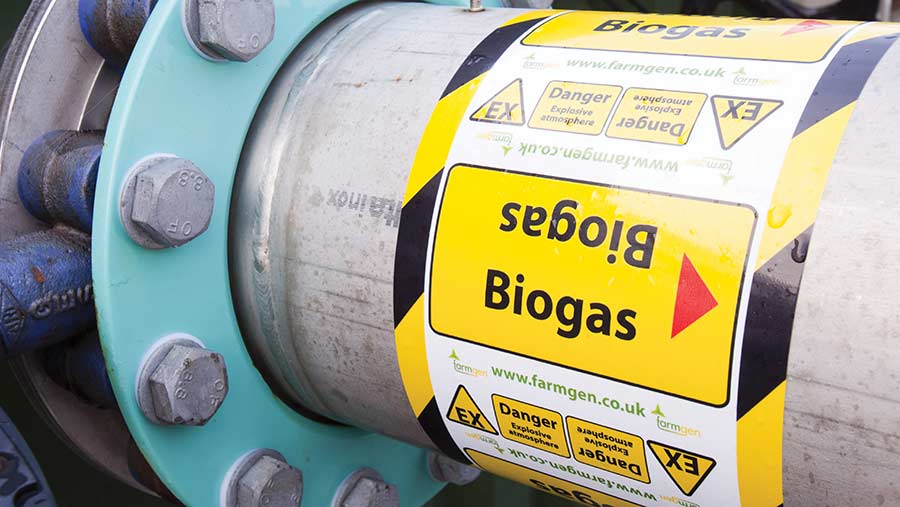Farmers’ green heating support gets spring overhaul
 © Global Warming Images/REX/Shutterstock
© Global Warming Images/REX/Shutterstock There has been a cautious welcome to reforms of the Renewable Heat Incentive (RHI) scheme unveiled by the Department for Business, Energy and Industrial Strategy (formerly Decc) last month.
Many in the sector welcome the government’s commitment to renewable heating to 2020-21, however farmers planning new projects must pay close attention to the changes to ensure new investments maximise funding opportunities.
Biogas and biomethane
Much has been made of the potential for farm anaerobic digestion and there is mixed news for this sector.
While tariff payments have been held or reset to the higher level of last spring, a limit on support for crop-based feedstocks has been introduced.
See also: Heating and transport offer big opportunities for biogas
It means new AD plants producing biogas for combustion or injection to the gas grid as biomethane will only receive RHI support for all heat generated or biomethane produced if at least 50% of the biogas or biomethane is derived from waste or residues.
Where the amount of biogas produced from non-waste feedstocks is greater than 50% of total gas output, this excess will not be eligible for support.
All plants will need to provide supporting information to Ofgem – which administers the RHI – showing the proportions of feedstocks used.
The government worries crop feedstocks have a more negative effect on the environmental than waste and may compete with land used for food production.
However, NNFCC analysis of AD crop supply chains shows many crops offer a 70% reduction in greenhouse gas emissions compared with fossil fuels, with the best savings for sugar beet and maize. Nitrogen fertiliser use and crop yields have a big effect on emissions, it acknowledges.
Digestate drying
In a further change, new RHI claimants (or those adding capacity after the date reforms come into effect) will no longer be able to claim support for heat used to dry digestate.
Tariffs for biomethane injection to the gas grid will be reset to the levels used between April and June 2016: Tier 1 (first 40,000MWh of eligible biomethane injection) – 5.35p/kWh; Tier 2 (40,000-80,000MWh/year) – 3.14p/kWh; Tier 3 (>80,000MWh/year) – 2.42p/kWh.
Biogas tariffs will be maintained at current levels (4.43p/kWh for small-scale units; 3.47p/kWh for medium-scale and 1.30p/kWh for large-scale). Any cuts (degression) to biogas tariffs between mid-December 2016 and the date the regulations come into force will be reversed on that date.
Biomass
While the government continues supporting biomass boilers, it is keen to reduce the domination of this technology within the RHI, particularly sub-1MW boilers, and wants to boost uptake of other technologies such as heat pumps and biogas.
The main change is the replacement of the three biomass tariff bands with a single tariff. Payments will be subject to tiering, whereby a higher Tier 1 rate (2.91p/kWh) is paid on a proportion of eligible heat up to a pre-set threshold (35% of a plant’s annual capacity), with subsequent heat generated receiving a lower Tier 2 rate (2.05p/kWh).
No tiering for the biomass-CHP tariff will be introduced.
The government will also examine whether wood fuel drying can remain an eligible heat use under the RHI.
Solar thermal
Plans to remove RHI support (domestic and non-domestic) for solar thermal have been dropped. Non-domestic tariffs, up to the existing capacity limit of 200kWth, remain at 10.28p/kWh.
Heat pumps
Despite relatively low uptake, the government believes heat pumps are important and wants to encourage future uptake.
It has retained tariffs at 2.57p/kWh for air-source heat pumps and 8.95p/kWh for Tier 1 and 2.67p/kWh for Tier 2 ground-source pumps. There is no change to the tier threshold.
Geothermal
Deep geothermal plant of all sizes will continue to be eligible for the scheme with a tariff of 5.14p/kWh.
Tariff guarantees
In a bid to improve investor confidence for larger projects with longer lead times, tariff guarantees will be introduced for certain technologies within the non-domestic RHI scheme.
Similar to pre-accreditation for Feed-in Tariffs, the guarantees will allow developers to secure a tariff earlier in the development process (within three weeks of financial close), rather than the date of accreditation. This rate will be guaranteed for six months (plants must be commissioned in that time).
Tariff guarantees will apply to large biomass boilers (>1MW), large biogas (>600kWth), GSHPs (>100kW) and all capacities of biomethane, biomass-CHP and deep geothermal.
However, the tariff guarantee process has an annual capacity limit (250GWh) and could be closed if strong take-up risks early closure of the RHI schemes due to budgets being exceeded. The government aims to give 21 days’ notice of any closure.
Read the consultation response (PDF)
RHI timeline
- Nov 2011 – Non-domestic RHI launched
- April 2014 – Domestic RHI launched
- Nov 2015 – Government confirms continued budget for the RHI until 2020-21
- Mar 2016 – Six-week consultation launched on proposed changes to RHI – 370 responses
- Apr 2016 – Budget cap mechanism introduced allowing scheme to close if risk of overspend
- Aug 2016 – Minimum 20% power efficiency requirement introduced for biomass-CHP
- Dec 2016 – DBEIS publishes consultation response
- Spring 2017 – Changes effective for new projects (not retrospective).
